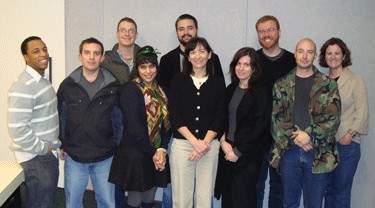Fall 2009 Crime Victim Litigation Clinic Students Help Advance Victims’ Rights
NCVLI’s Crime Victim Litigation Clinic had another successful semester this past fall, expanding to include 7 students because of high demand. Students had lots of opportunity for legal research and writing as they learned about victims’ rights law.
Open gallery

NCVLI’s Crime Victim Litigation Clinic had another successful semester this past fall, expanding to include 7 students because of high demand. Students had lots of opportunity for legal research and writing as they learned about victims’ rights law. Just a few highlights of the semester include:
Matthew Abts wrote a legal memorandum on the abatement ab initio doctrine that was used in drafting an amicus curiae brief filed in the Alaska Supreme Court in December 2009.
Mika’il Ali and Travis Smith conducted the preliminary research on what will be a significant amicus curiae brief by NCVLI to the California Supreme Court in Spring 2010. In the brief, NCVLI will argue that under California’s new constitutional amendment crime victims have the right to be notified of all subpoenas touching their records, and the opportunity to be present and heard on quashing of such subpoenas.
Daniel DiVittorio compiled a 50 state survey analyzing the language of state criminal codes governing sex crimes. The language used in certain sex crime statutes discloses details of the crime perpetrated against the victim that unnecessarily infringes upon victim dignity, fairness, and privacy (e.g. type of penetration). Daniel’s work was provided to the Oregon Sexual Assault Task Force to aid in its analysis of Oregon’s statutory provisions.
Fabiana Ochoa researched whether courts have the authority to issue parenting time orders for a defendant where there is a criminal no contact order in place between the custodial parent and the defendant.
Nick Tipton prepared a memo on whether an intoxicated person can consent to sex under the states’ various consent laws. Nick’s memo was used to help an author with research for an article directed to men, warning of the dangers of sex while intoxicated.
Zachary Walker wrote a legal research memorandum on the restitution rights of victims of human trafficking that NCVLI relied upon when responding to a technical assistance request from attorneys representing labor trafficking victims.
Other projects included whether a victim is entitled to modification of a restitution order following settlement in a civil action; whether Oregon’s new victims’ rights statute, SB233, applies in municipal courts; and what the proper notification procedures are under California law when a victim’s private records are subpoenaed from a third party.

